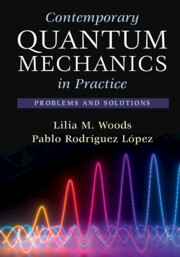
- Publisher:
- Cambridge University Press
- Online publication date:
- June 2024
- Print publication year:
- 2024
- Online ISBN:
- 9781009355414

This helpful and pedagogical book offers problems and solutions in quantum mechanics from areas of current research, rarely addressed in introductory courses or textbooks. It is based on the authors' own experience of teaching undergraduate and graduate courses in quantum mechanics, and adapts problems from contemporary research publications to be accessible to students. Each section introduces key quantum mechanical concepts, which are followed by exercises that grow progressively more challenging throughout the chapter. The step-by-step solutions provide detailed mathematical derivations, and explore their application to wider research topics. This is an indispensable resource for undergraduate and graduate students alike, expanding the range of topics usually covered in the classroom, as well as for instructors and early-career researchers in quantum mechanics, quantum computation and communication, and quantum information.
‘The rapid development of quantum science and technology in the last quarter of a century has made it necessary to redesign introductory courses in quantum mechanics in order to incorporate new developments. This book by Woods and Lopez fills the urgent need for a modern problem book for such courses. Its selection of topics is well balanced, and the problems are designed to provide a stepping stone to issues of contemporary research.’
Charis Anastopoulos - University of Patras
‘An excellent complement to a modern quantum mechanics book. It exemplifies both the basics and several areas of important modern quantum mechanical research through solved exercises of relevance to condensed matter, atomic physics, quantum computation and foundations.’
Horatiu Năstase - São Paulo State University
‘There are many textbooks on quantum mechanics, but this book does not add another. Rather, it provides worked problems as opportunities to apply the concepts covered in lectures and textbooks. These problems address advanced and modern topics such as geometrical phases, the density operator, indistinguishable particles, and relativistic quantum mechanics. In my experience, it is crucial for students to not only understand the concepts, in the sense of having followed the arguments presented in the lecture or textbook, but also to develop an intuition for what the formalism actually means. This intuition is also essential for the ability to go beyond it, i.e., to make progress. Intuition comes from applying formalism to actual problems, and this book by Woods and Lopez provides plenty to opportunities to do that.’
Carsten Timm - TU Dresden
 Loading metrics...
Loading metrics...
* Views captured on Cambridge Core between #date#. This data will be updated every 24 hours.
Usage data cannot currently be displayed.